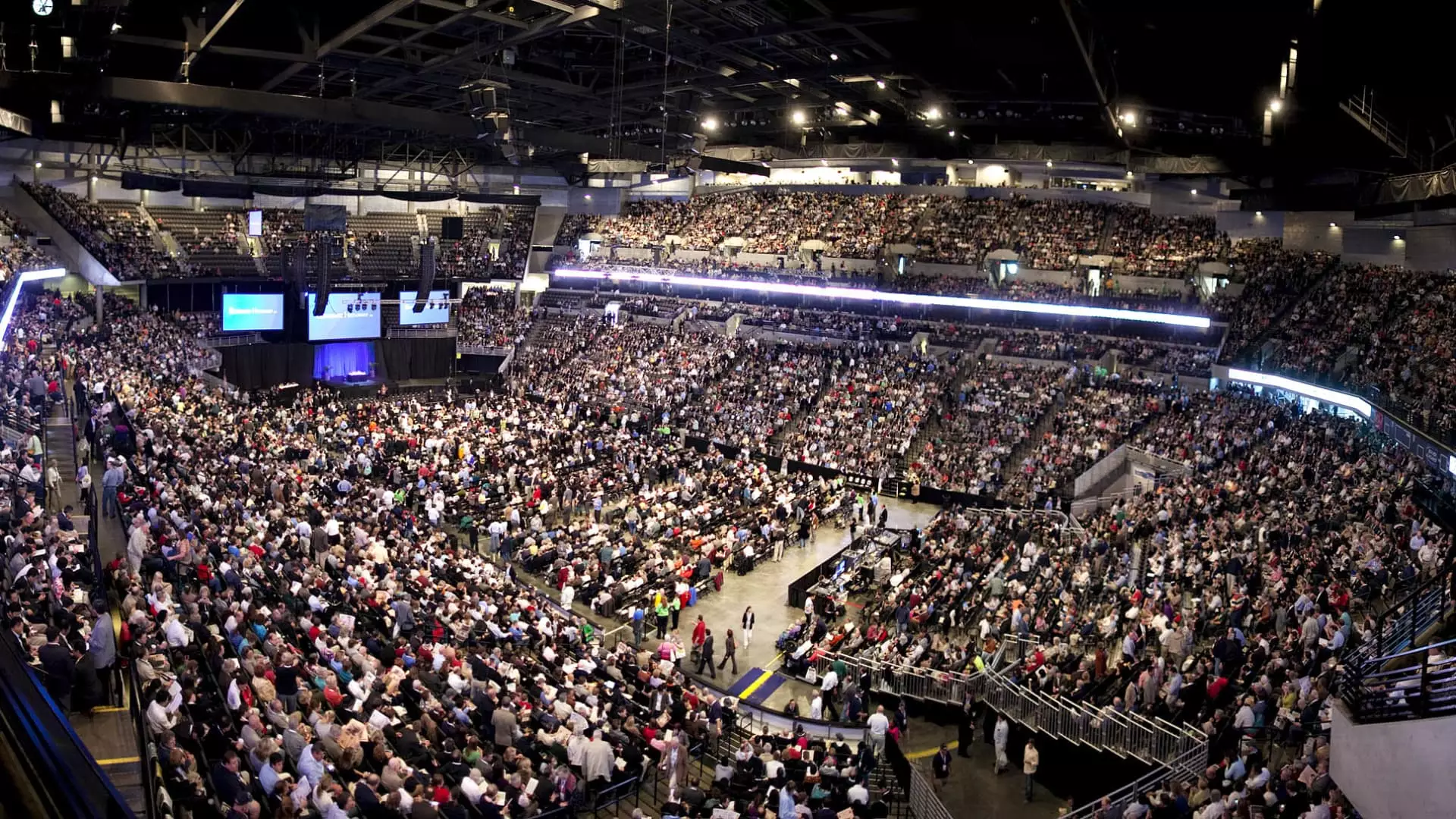The annual meeting of Berkshire Hathaway has morphed from an obscure gathering into what some affectionately deem the “Woodstock for Capitalists.” As Warren Buffett readies himself for his 60th year at the helm, it’s astonishing to reflect on how an event that began in 1965 with only a dozen attendees has blossomed into a colossal festival attracting over 40,000 participants from all corners of the globe. While this transformation may seem like a saga of sustained success, a deeper inspection reveals troubling implications about capitalism, celebrity, and the distillation of wisdom from commercial prowess.
Buffett, now at the venerable age of 94, has long been hailed as the “Oracle of Omaha.” His amiable persona and strategic insights have captured the attention of budding investors, and for many, his words carry the weight of gospel. Yet, the earnest admiration for Buffett has burgeoned into uncritical reverence, akin to that reserved for pop culture icons rather than nuanced thinkers. It’s essential to differentiate between investment acumen and the cultural significance ascribed to figures like Buffett—after all, can a business sage truly embody each tenet of ethical capitalism while basking in this ocean of blind adulation?
The Inimitable Presence of Charlie Munger
This year marks the first Berkshire meeting without Charlie Munger, Buffett’s long-time confidant and partner in extending Berkshire Hathaway’s empire. Munger represented a counterbalance to Buffett’s charm, often underscoring the importance of directness and intellectual rigor as essential elements of effective decision-making. The absence of Munger raises a question often overlooked: can wisdom truly reside within a singular figure? While Buffett captures the crowd’s exuberance with anecdotes, Munger embodied a more grounded approach to investments and life. This void in the discourse could either reinforce Buffett’s dominance or signal a troubling decline in the quality of dialogue surrounding investments.
Newly appointed CEO Greg Abel and insurance chief Ajit Jain are slated to join Buffett on stage, but the historical context of such platforms brings unease. With Munger gone, the depth of insight during the event may taper off, and the conversation risks becoming a rehearsed performance rather than a genuine exchange of ideas. The implications of a less critical examination of investment strategies underscore a growing tendency to idolize leaders devoid of distinct confrontational voices.
Commercialization and Charity: A Coexistence of Contradictions
The growing emphasis on “Berkshire Bazaar of Bargains” during the weekend indicates a troubling commercialization of what was once a rather solemn event focused on investment philosophy. While it is commendable that proceeds from auction sales will benefit local charities like the Stephen Center for the homeless, the juxtaposition of profit and philanthropy raises ethical questions. Can we glorify capitalism and altruism simultaneously when one pillar is built upon the accumulation of wealth while the other seeks to alleviate the suffering spurred by economic inequalities?
The dashboard of Berkshire Hathaway’s growth echoes not just a success story but a cautionary tale. When profit becomes the primary measure of human worth, do we not risk dehumanizing those who fall outside the financial framework? Being part of an elite gathering should come with responsibilities, and yet the overwhelming fanfare belies an essential discourse on ethical capitalism in the twenty-first century.
The Allure of Community Amid Complexity
Despite the complexities and contradictions, the event continues to draw in attendees, who often speak of an inexplicable sense of community. Real-life interactions in Omaha evoke sentiments reminiscent of spirituality for many, suggesting a deeper human desire for connection—perhaps even belonging in an increasingly isolated world. However, it’s essential to question whether the branding of such experiences as a communal ‘rite of passage’ overshadows the need for critical thought. While community bonds are essential, should we strive for deeper discussions rather than settling into the allure of shared celebration?
As Berkshire Hathaway’s annual meeting approaches its diamond jubilee, it raises pivotal questions about the intersection of wealth, wisdom, and human connection. Is it merely nostalgic to aim for meaningful dialogue that transcends the glitz, or is this tension an essential journey for all? Those who partake in the experience should tread thoughtfully, acknowledging both the allure of capitalism and the urgent need for grounded discourse on its ethical practice.

